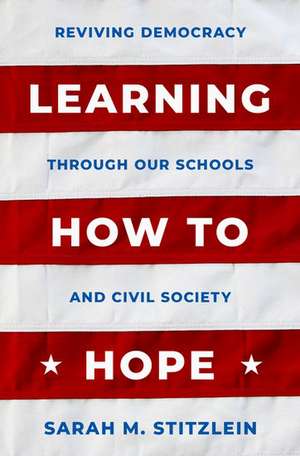Learning How to Hope: Reviving Democracy through our Schools and Civil Society
Autor Sarah M. Stitzleinen Limba Engleză Hardback – 24 ian 2020
Preț: 207.72 lei
Nou
Puncte Express: 312
Preț estimativ în valută:
39.75€ • 41.60$ • 33.08£
39.75€ • 41.60$ • 33.08£
Carte disponibilă
Livrare economică 10-24 martie
Livrare express 22-28 februarie pentru 25.68 lei
Preluare comenzi: 021 569.72.76
Specificații
ISBN-13: 9780190062651
ISBN-10: 0190062657
Pagini: 184
Dimensiuni: 236 x 163 x 23 mm
Greutate: 0.41 kg
Editura: Oxford University Press
Colecția OUP USA
Locul publicării:New York, United States
ISBN-10: 0190062657
Pagini: 184
Dimensiuni: 236 x 163 x 23 mm
Greutate: 0.41 kg
Editura: Oxford University Press
Colecția OUP USA
Locul publicării:New York, United States
Recenzii
Stitzlein (Univ. of Cincinnati) critiques the state of democracy and discusses a possible solution to reviving civil society. Faced with overwhelming hopelessness in political life, she argues the solution is to teach hope. Grounded in pragmatist philosophy, Stitzlein defines hope by articulating the ideas of John Dewey in relation to inquiry and building habits. From this groundwork she shows that pragmatist hope is the virtue that will help society face its struggles by building a democratic identity. ... Offering an insightful critique of Angela Duckworth's 2016 book Grit, Stitzlein also contends that parents and educators should emphasize hope rather than grit. In the end habits of hope will create new identities and tie communities together. This engaging commentary offers a thoughtful look at a possible collective path toward shaping democracy for a better future.
"This book is a welcome addition to the literature on hope, and helps push our understanding beyond familiar political slogans and cloying greeting-card messages. Stitzlein's background in political theory and pragmatism allows the discussion to range well beyond the usual confines of analytic moral psychology and philosophy of mind, while her expertise in the philosophy of education makes the book especially valuable for teachers interested in how hoping can help us learn, and how learning can foster new hopes."
"John Dewey has a new champion. Drawing on the rich tradition of philosophical pragmatism, Sarah Stitzlein presents a bracing diagnosis of American schools and American culture. Everyone interested in improving American education should read this inspiring and instructive book."
"In this timely book, Stitzlein draws on the current political moment to envision hope not as a sentimental antidote to polarization and despair but rather as a foundation for pragmatist civic action. Grounding hope in a set of habitual actions that sustain both citizens and their society, this book illuminates ways to enact civic, pluralistic solidarity which would enable the American political community to transcend challenges to democracy through shared action."
"This book is a welcome addition to the literature on hope, and helps push our understanding beyond familiar political slogans and cloying greeting-card messages. Stitzlein's background in political theory and pragmatism allows the discussion to range well beyond the usual confines of analytic moral psychology and philosophy of mind, while her expertise in the philosophy of education makes the book especially valuable for teachers interested in how hoping can help us learn, and how learning can foster new hopes."
"John Dewey has a new champion. Drawing on the rich tradition of philosophical pragmatism, Sarah Stitzlein presents a bracing diagnosis of American schools and American culture. Everyone interested in improving American education should read this inspiring and instructive book."
"In this timely book, Stitzlein draws on the current political moment to envision hope not as a sentimental antidote to polarization and despair but rather as a foundation for pragmatist civic action. Grounding hope in a set of habitual actions that sustain both citizens and their society, this book illuminates ways to enact civic, pluralistic solidarity which would enable the American political community to transcend challenges to democracy through shared action."
Notă biografică
Sarah M. Stitzlein is Professor of Education and Affiliate Faculty in Philosophy at the University of Cincinnati. As a philosopher of education, she explores the purposes and practices of education from the perspective of social and political philosophy with an aim to uncover problems in education and envision better alternatives. She is president of the John Dewey Society, co-editor of the journal Democracy & Education, and winner of the University of Cincinnati Excellence in Teaching Award. She has earned grants from the National Endowment for the Humanities, Templeton Foundation, Spencer Foundation, Center for Ethics & Education, and the American Association of University Women among others. She speaks about her work often through public lectures, in radio interviews, via podcasts, and other outlets. Her books have won the Critics' Choice Award from the American Educational Studies Association.
